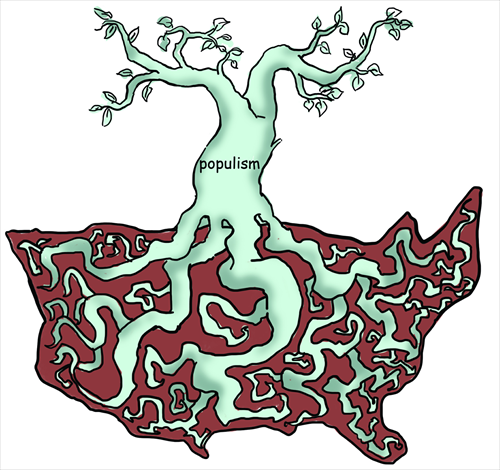China-bashing in primary season reflects deep nativism in US

Illustration: Liu Rui/GT
Ever since the US 2016 presidential primaries started, China-related topics have become a candidates' tool to attack their competitors or fanning the flames of national sentiment to win more support. Both Hillary Clinton, a professional politician with rich experience of diplomatic affairs, and Donald Trump, a businessman with no political experience at all, have frequently accused China of stealing US jobs, and both have vowed to change the situation.
Looking back on the history of US elections, China is far from a major topical issue during presidential campaigns, but has been often targeted for no reason in recent years. From the trade imbalance in 1990s, to today's yuan exchange rate, the approaches to utilizing China issues are basically the same, which is to blame China for Americans' greatest concerns - the nation's sluggish economy and unemployment problems.
Political figures from both the Democratic and Republican parties tend to accuse their competitors for being "weak" when facing China, while highlighting that once elected, they will be tougher. Under such logic, the China-related issues are in fact an extension of US domestic economic problems. The same language has also been applied to other countries with close trade ties to the US like Mexico and Japan.
Using China politically, candidates from both the GOP and Democratic Party have evidently revealed their inclination toward populism or nativism. Within the Democratic Party, given the continuous challenges of Bernie Sanders, Clinton's campaign focus has been switched to the interests of voters from the lower middle class, and has started to positively respond to economic appeals from this group. However, since that she cannot put forward any reasonable and practical reform policy, she can only use inflammatory words to shift the focus of contradictions.
In the GOP, Trump has been explaining all US problems as "non-native" issues, which are caused by countries in the outside world or immigrants. Nativism traces back to the nation's colonial period. The Know Nothing movement, extremist groups that advocated white supremacy such as Ku Klux Klan, and the Chinese Exclusion Act passed in 1882 all reflect this history.
Today, Trump has once again awakened the nativism in the US. From building up a wall along the US-Mexican border, banning all Muslims from entering the country, and expelling illegal immigrants, his remarks have turned this multicultural state's "American dream" on its head.
The current revitalization of populism and nativism reflect US citizens' dissatisfaction, uneasiness, anger, and fear. Politically, during US President Barack Obama's term, the Washington's partisan struggle showed no sign of improvement. Certain politicians cash in on the polarized politics at all costs, even including a government shutdown and a downgrade of the country's credit rating. Tired of the partisan struggle, the public has turned to the anti-establishment political figures for a change.
Although the US economy is in recovery, ordinary people, especially non-college educated whites, are suffering from low-level and unstable employment with frequent job-hopping. They are not able to cope with the impact to the labor market which is brought by the capital and immigrants flow under globalization. In terms of social affairs, the population of ethnic groups such as Latino-Americans is growing, and immigrants have become a major factor of demographic changes.
With the question of "who are we," terrorists have emerged among immigrants under the influence of radical religious beliefs. Tensions between white people and ethnic groups have been intensified, and these have created a hot bed for xenophobia. Given the Syrian crisis and the rise of extremist groups including the Islamic State, the puzzles of anti-terror campaign and the refugee problem are once again haunting citizens in the US.
Compared with the year of 2008, Americans' desire for practical change has not declined at all. The gap between Obama's promise and the reality over the past eight years has resulted in an accumulation of grievance. Political figures should no longer incite the people by writing blank checks or using extreme negative wordings, or shift the responsibility to other nations. Instead, they should deal with major problems in the US rationally and practically. Only that is the responsible attitude for not only the US, but also the world.
The author is a researcher at the Chinese Academy of Social Sciences's Institute of American Studies. opinion@globaltimes.com.cn Follow us on Twitter @GTopinion